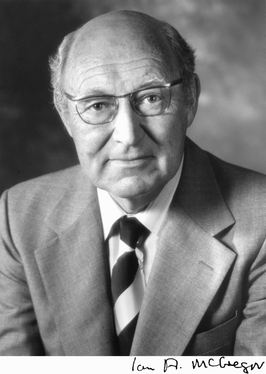Ian McGregor (malariologist)
Scottish malariologist
Ian McGregor (1922–2007) was a renowned Scottish malariologist whose pioneering research significantly advanced the understanding and treatment of malaria. His work in West Africa was instrumental in developing strategies for malaria prevention and control.
Early Life and Education[edit | edit source]
Ian McGregor was born in Edinburgh, Scotland, in 1922. He pursued his medical education at the University of Edinburgh, where he developed an interest in tropical medicine. After completing his medical degree, McGregor further specialized in parasitology and tropical diseases, which laid the foundation for his future work in malaria research.
Career and Research[edit | edit source]
McGregor's career in malariology began in earnest when he joined the Medical Research Council (MRC) in The Gambia in the 1950s. His research focused on the epidemiology and immunology of malaria, particularly the interactions between the Plasmodium falciparum parasite and the human host.
Contributions to Malaria Research[edit | edit source]
McGregor's work was groundbreaking in several areas:
- Immunology of Malaria: He was one of the first to demonstrate that humans could develop immunity to malaria after repeated exposure. This finding was crucial in understanding how vaccines could be developed to combat the disease.
- Malaria in Pregnancy: McGregor conducted extensive studies on the impact of malaria on pregnant women and their infants. His research highlighted the increased risk of anemia and low birth weight associated with malaria in pregnancy, leading to improved treatment protocols.
- Community-Based Studies: He pioneered community-based studies that involved local populations in the research process. This approach not only provided valuable data but also helped in educating communities about malaria prevention.
Later Life and Legacy[edit | edit source]
After retiring from active research, McGregor continued to contribute to the field through advisory roles and publications. He was a mentor to many young scientists and remained active in the scientific community until his death in 2007.
McGregor's legacy is evident in the continued efforts to combat malaria worldwide. His work laid the groundwork for many of the strategies used today in malaria prevention and treatment.
Honors and Awards[edit | edit source]
Throughout his career, Ian McGregor received numerous accolades for his contributions to medical science, including:
- Fellowship of the Royal Society
- The Chalmers Medal from the Royal Society of Tropical Medicine and Hygiene
- Honorary degrees from several universities
Related Pages[edit | edit source]
Search WikiMD
Ad.Tired of being Overweight? Try W8MD's physician weight loss program.
Semaglutide (Ozempic / Wegovy and Tirzepatide (Mounjaro / Zepbound) available.
Advertise on WikiMD
|
WikiMD's Wellness Encyclopedia |
| Let Food Be Thy Medicine Medicine Thy Food - Hippocrates |
Translate this page: - East Asian
中文,
日本,
한국어,
South Asian
हिन्दी,
தமிழ்,
తెలుగు,
Urdu,
ಕನ್ನಡ,
Southeast Asian
Indonesian,
Vietnamese,
Thai,
မြန်မာဘာသာ,
বাংলা
European
español,
Deutsch,
français,
Greek,
português do Brasil,
polski,
română,
русский,
Nederlands,
norsk,
svenska,
suomi,
Italian
Middle Eastern & African
عربى,
Turkish,
Persian,
Hebrew,
Afrikaans,
isiZulu,
Kiswahili,
Other
Bulgarian,
Hungarian,
Czech,
Swedish,
മലയാളം,
मराठी,
ਪੰਜਾਬੀ,
ગુજરાતી,
Portuguese,
Ukrainian
Medical Disclaimer: WikiMD is not a substitute for professional medical advice. The information on WikiMD is provided as an information resource only, may be incorrect, outdated or misleading, and is not to be used or relied on for any diagnostic or treatment purposes. Please consult your health care provider before making any healthcare decisions or for guidance about a specific medical condition. WikiMD expressly disclaims responsibility, and shall have no liability, for any damages, loss, injury, or liability whatsoever suffered as a result of your reliance on the information contained in this site. By visiting this site you agree to the foregoing terms and conditions, which may from time to time be changed or supplemented by WikiMD. If you do not agree to the foregoing terms and conditions, you should not enter or use this site. See full disclaimer.
Credits:Most images are courtesy of Wikimedia commons, and templates, categories Wikipedia, licensed under CC BY SA or similar.
Contributors: Prab R. Tumpati, MD

